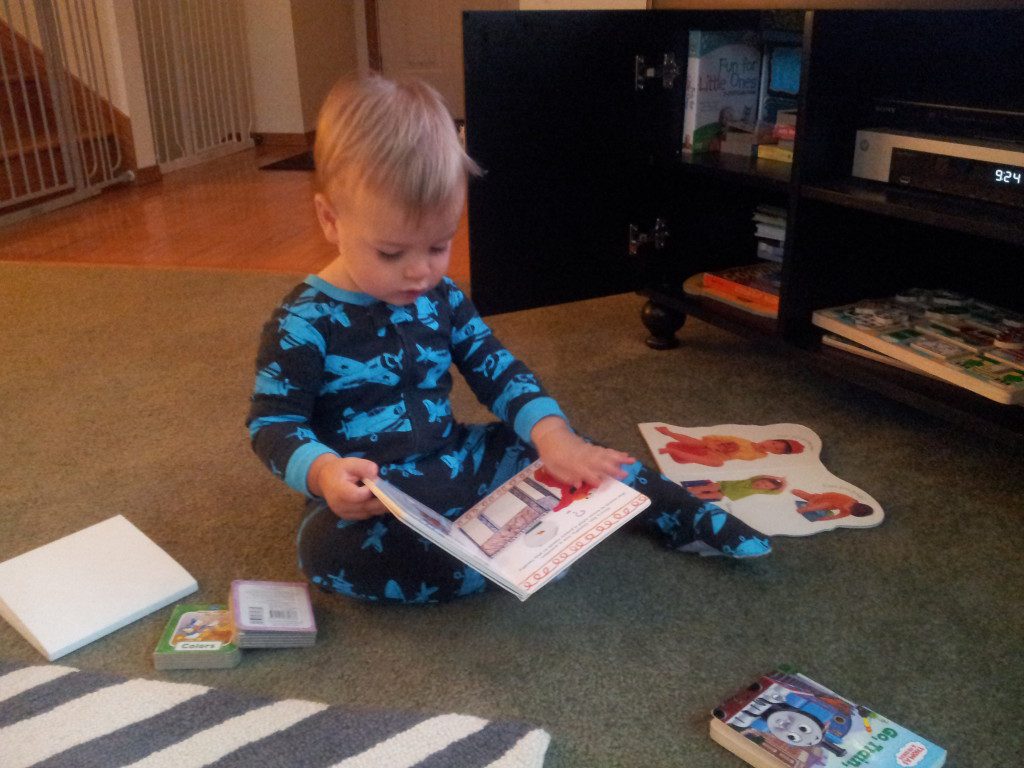A year ago, my son was about to turn 2 and had never said the word “Mama.”
Or “Dada.” Or “ball.” Or “up.” Mason was silent and stoic, and we were nervous.
 Our pediatrician frowned at the communication questionnaires I filled out and recommended speech therapy. I frantically Googled things like “2 year old won’t talk” and tried to ignore the voice in my head.
Our pediatrician frowned at the communication questionnaires I filled out and recommended speech therapy. I frantically Googled things like “2 year old won’t talk” and tried to ignore the voice in my head.
We did everything we could think of to get him talking. We talked and read to him constantly, we bought flashcards with bright pictures on them, we implemented ideas from the book our pediatrician recommended.
I remember being with Mason at the library and chatting with another mom, whose son was 9 months younger than mine and talking up a storm. I was so envious of their interactions. “You’re right, that is a ball! Yes, a blue ball!” When she asked how old my son was and I told her, she looked confused. (Or maybe I just imagined it.)
During a parent-teacher conference at Mason’s daycare, I saw two words on his development report that I’ll never forget. Under communication skills: “extremely delayed.” I went home in tears.
Today, Mason is a few months from his third birthday, and he’s a total chatterbox. His vocabulary includes hundreds of words–too many to count, and more every day. His pronunciation isn’t as sharp as some kids’, and his sentences aren’t quite as sophisticated, but you’d never guess that a year ago he was only babbling.
If you’re the mom of a quiet toddler: be encouraged.
We all know that every child is different, and that they all learn at their own pace–or at least, we “know” that–but those darned milestones have a way of shaking our faith. (Unless our kids are meeting them early, in which case: look how smart they are!)
And of course, we ALL have friends whose kids are doing things sooner/better/easier…
One thing I’ve learned is to to recognize when a behavior is more a reflection of my son’s personality than his development or my parenting. Even though he’s talking now, Mason is still a reserved kid by nature. It takes him awhile to warm up to new environments and new people, and until he does that, he’s quiet. (I know: not the worst thing in the world for a toddler!)
Oh, and we did get that speech therapist, for a few months. She was wonderful with Mason, but she helped me even more. She had complete confidence in my son, when my own was faltering, and she gave me things to do so I could feel like I was “helping.”
In the end, though: my son talked when he was ready. Not a second sooner.
If you’re the mom of a late talker, and you find yourself wanting to feel like you’re helping, here are a few ideas to try. (This is a mix of tips and tricks from our speech therapist and our own experiences–but as always, remember that every child responds to things differently!)
Get your child’s ears checked
I was extremely reluctant to do this, since Mason seemed to hear fine–he reacted to sounds, responded to his name, etc. But even a small amount of hearing loss can impair speech development. (I’ve read that it’s like being underwater–imagine trying to learn a foreign language that way!)
In the end, a visit to the audiologist did detect some hearing loss, and the doctor recommended ear tubes. Mason didn’t start speaking until several months after the tubes, so we’re not sure how much we can credit them with his progress, but we definitely didn’t regret getting them. (Bonus side effect: no ear infections!)
Figure out what motivates your child
This was our speech therapist’s very first piece of advice. The idea is to teach kids that communication helps them get things they want–it’s not just for pleasing Mom and Dad. So instead of encouraging them to talk just for the sake of talking (“can you say Mama?”), save the prompting for things they care about.
Food and drink are common motivators. If your child wants a drink, withhold the cup a little bit and see if he’ll say “milk” (or whatever) to get it.
Encourage interaction through sounds
Sounds are precursors to speech and a great place to start. Talking about animal sounds is perfect for this, especially if your child is into animals.
Our son was into one thing, and one thing only: cars. So, our speech therapist encouraged as much vroom-vrooming and beep-beeping as possible.
Let them finish
Mason’s first word was “go,” and we got him to say it by prompting him with the phrase “ready, set, go.” We started using the phrase while playing with his cars, and once we were sure he was familiar with it, we’d say “ready, set…” and then wait. We did this over and over and over, and eventually, it clicked.
This method works great with books too–especially rhyming ones. Once you’ve read the child the book several times, try pausing before the last word of an easy sentence to see if he’ll fill in the blank. We still do this all the time with Mason, and he loves the opportunities to participate.

Get the child’s attention
We were coached to come down to Mason’s eye level and wait until he looked at us to speak (when prompting him). It was amazing how often we weren’t taking the time for this simple step.
Wait longer than usual for responses
We noticed that if we gave Mason a prompt and he didn’t make an effort to respond right away, we’d keep repeating the prompt. “Up? Can you say up? Do you want up?” But the problem wasn’t that he hadn’t heard us.
Eventually, we learned to wait an uncomfortable amount of time after a prompt, to give him plenty of time to respond if he wanted to.
Keep the pressure off
Mason used to get (actually, still gets) stage fright if he felt like he was being put on the spot. Sometimes, when he’d be playing alone, I’d overhear him making car sounds and bud in with comments like, “that’s right, buddy, vroom-vroom!” When he’d realize I’d been listening, he’d look flustered and immediately clam up. #fail!
Make a personalized picture book
Mama and Dada are often kids’ first words because they’re easy to say. But for some kids, the in-their-face interaction that’s usually happening when they’re taught those words can be intimidating. It can be helpful to encourage speech while focusing on something else–like a book.
We got a blank board book, like this one, and filled it with pictures of my husband and I, as well as all of Mason’s favorite things: a car, a truck, Elmo, and Mickey, plus some easy-to-say words like dog and ball. He loved it!
Don’t let the milestone police get you down
In retrospect, I wish I wouldn’t have let my pediatrician’s concerns get to me so much. I understand the importance of early intervention in some cases, but my son wasn’t showing any other concerning signs, and I had so many people (including the speech therapist) assuring me he’d catch up. Why was I so focused on the worst case scenario?
My final tip (and this applies to basically anything parenting-related): whatever you do, beware of Google!
To mimic what I heard many, many times during that phase: hang in there, Mama. Before you know it, your kid will be talking your ear off, and you’ll look back with fondness on those sweet, silent days.













My oldest was just past 2 before she talked. Being the 1st we, too, were sure she would not talk. When she finally did, it was like a little adult. She is still a quiet girl at 40. She is a listener. As the 1st grandchild she got everything by just pointing — had no need to talk.
Interesting! Yes, I think this being our first child made the whole situation that much more stressful!
Thank you Kim! You are very inspiring and you have me hope!
OMG this is an old article, why did you wait so long! My first born has a speech delay as well and knew 50 words by the time she was 2 and a half, I knew she would need extra help, I ended up contacting help me grow, they came to the house evaluated her and she got the help. She is 4 now she still has some issues with skipping certain vowels but I’d you don’t catch it early it will make things harder on the child. Every kid is different and they start out at there own pace, it is just something you have to work on together. Ugh it just frustrating to wait
I loved and needed to hear this, im a mom of a 19 month old and shes barely said a handle of mumbled words.
Thank you for being honest in a world were parents refuse to be.
Wonderful article Kim! I wish I had known all of this a year ago myself! I too was worried when my daughter at almost 2 barely spoke and everyone thought she was so much younger than she was but at 3 she too can talk up a storm. You are right that early intervention is important but also we need to let go of the milestone police:)
Exactly! I can’t fault my pediatrician for trying to help, but she probably didn’t realize how much stress she caused me. 🙂
This is my story for my twins! They are over 2 and barely saying anything. I’ve already done all of these suggestions to feel like I am helping. You have no idea how much better this article made me feel! To top it off, I’m a teacher so I fe very judged about their “delay.” Thanks so much for writing this!
I’m so glad you found the article comforting! My son didn’t really start talking until 2 1/2, and it was a VERY slow process at first, but now I already can’t remember what it was like before he talked. It’s so hard not to worry, especially when everyone around you seems so worried–tried to ignore them! Turn up your nose and stick up for your kiddos. 🙂 I love that you put the word delay in quotes, too…why in the WORLD do we use that word in relation to milestones, when milestones are just general guidelines by definition?? Anyway…I hope you feel encouraged, Stacy. You’re not as alone as you might think (and neither are your kids).
As a foster parent, I have cared for multiple kids with a speech delay, several very severe. I am very familiar with Early Intervention and grateful for their help. The book “The Late Talker” was also very helpful in giving suggestions of things to try, especially with kids with apraxia.
Thanks Deb!
Thank you for this. My son was born very early (23 weeks). He has several medical-types following his progress and at every appointment we are asked about everything he is and is not doing. It’s so very hard to know what he’s going to do at his own pace and what might be cause for concern/intervention. We are trying everything for speech resources because our insurance won’t cover them (don’t even get me started on that!). I’m hopeful that a bit of intervention will get him on the right track!
I’m hopeful for you too! It’s impossible not to stress about it, but know that you’re doing everything you can for your son. The rest is up to him & to time.
Amy, have you looked into your states early steps program? These people are wonderful! I was lucky in that our pediatrician provided me with information or I would never had known about them. Children under 3 with speech, motor, or developmental delays are accepted. Medicaid fully pays for the therapist (Who will come to You, home, daycare, wherever). If your child isn’t covered by medicaid they do charge but it is income based, not sure the scale. Look into this program and see if your state has it, they helped our daughter (and us) immensely! Wishing you the best.
This couldn’t have come at a better time. My guy is 2 and isn’t a talker and it has me worried. We did start speech therapy this week. When I hear other lo’s his age or younger talking up a storm it worries me. I know they do things at their own pace but it’s just hard.
Yes, so hard. You might be surprised how many others aren’t talking much either, though…it’s just the big talkers who stand out to us and get us all scared! My best to you and your family!
Thanks for this article. I have my first child and all i can think about is when ill here her beautiful voice. I often dream of her talking to me in my dreams. I had so much confidence in her talking but as time is going by and still no words im also a victim of mildstone policing. I needed this fresh breath of air so i too can get back to not worrying and just enjoy her growth and love… Thankyou
Thank you so much for this article. Our little girl is 2 and still not speaking. We are doing speech therapy once a week, it has helped a little, however I just can’t wait for her to say mama! Thank you again for this special message!
She WILL! And it will be everything you hoped it would be. 🙂 Hang in there, Nichole!
Great article!! Thank you so much for sharing your story and your great tips. Our son is 15 months with no words yet and we’re right in the middle of all the dr visits, evals and speech referrals. This is a great reminder that kiddos develop on their own timeline and we shouldn’t overanalyze every milestone. So happy your little guy is talking up a storm now!
I love this! Thanks so much for sharing tips that worked for you and also, reassurance that every baby is unique in their own way. I tell this to moms of the babies I care for and my mom friends all the time. Each baby is unique and excels at whatever fits their personality. Sometimes I’m jealous of the babies who sleep through the night and can sit through story time and nurse without popping off 100 times to look around the room. But then I’m reminded that that’s just part of her adventurous nature. I’m so lucky to have a happy, chatty baby who’s trying to climb the couches and can’t play with her toys for longer than 5 minutes. It keeps me on my toes and entertained and I wouldn’t have it any other way. Bless you and your beautiful baby for being perfectly unique!! xoxo
YES, thanks Laura! So true, and somehow SO easy to forget.
So it took me about four tries to finish this blog through without sobbing!!! My son turned 2 in November and is still not talking, he hums a lot and babbles but still no words. When I went to pick him up from school a boy in his class said, “Hello Liam’s Mama, how are you today?” I silently cried on the way home…it’s hard not to automatically think of the worst. We currently have a speech therapist who like yours is incredibly confident and encouraging. She too is helping us with ways to motivate him into finishing phrases or songs that he knows. His favorite is 5 Little Monkeys and he knows the motions and shakes his little finger and everything so we know he’s understanding. We did have his ears checked and he did have some fluid so we had tubes put in…people told me that in no time he will be speaking…here we are waiting 3.5 months later and still nothing.
However, I want to tell you that your post has made me feel far more hopeful than I’ve felt in a long time. A lot parents have told me about their nephews or neighbors kid who didn’t speak until much later but your blog has resonated so much. I am sending you copious amounts of thanks!
I’m so happy to hear that you found this helpful Jorye! Our situations sound identical. Same thing with the tubes–we read so many magical stories online about kids who were speaking within days or weeks after surgery. Not so with us either. Honestly, the fact that your son is being that interactive with the 5 Little Monkeys song should be hugely encouraging to you. Try to focus on what you love most about him and just let yourself enjoy him while he’s this age! 🙂 I promise you he WILL talk!
I truly enjoy your wonderful suggestions for encouraging speech!
I do wish to mention that quite often, that nagging voice is exceptionally accurate. My 4 year old has Autism,so for our family, that release did not come. You know, the big sigh when the all clear for Neurotypical becomes abundantly clear?
The absolute most frustrating thing for me, turned out to be parents and assorted others who in an attempt to console my worries and be encouraging, offered up cliche phrases about Einstein not speaking until much later (which is not comforting since he clearly had Autistic tendencies) or some anecdotes regarding their own children. It put me in a place of delay, where I honestly waited a year longer than I should have. A year of Early Intervention completely out the window. I this cannot over emphasize the importance of pursuing that inner voice of intuition.
So cautiously now, while I hear moms chatter and inquire, and sometimes unfortunately fret with those phishing questions, my response is always to advise they pursue it, if nothing else than to put their mind at rest.
I’m so sorry you didn’t get your release, Jillian. Excellent point–yes, there is a legitimate reason pediatricians are concerned about this. My little brother is autistic so I understand what that world’s like too. Our audiologist was wise enough to warn us about that Einstein thing before we heard it elsewhere–but, as you know, we concerned parents will latch onto any hope we can find.
I totally agree that it’s always worth pursuing intervention–like I said, in our case, it was more so that I felt like I was helping/doing everything I could. I still don’t regret it.
Thank you for sharing your perspective!
Hello,
I love your post and it’s always encouraging to hear. I also fully agree with Jillian. I have two on the spectrum and wish I would have listened to my inner voice at 2 years old. If I had more intervention would have helped my daughter immensely. So, I think it’s always wise to pursue interventions even when we know or are encouraged that their speech will come in. My daughter is 7 now. Speaks in 2-3 words and my son is currently in speech and has been since he was 3. Thanks for sharing your heart and experiences with us to encourage other moms.
I have twin boys who will be 2 in a week. The shy one is more talkative, saying all sorts of words and even some two word phrases. The more outgoing one doesn’t really say anything but use body language perfectly. Facial expressions and pointing, etc. He can say no and don’t but otherwise very quiet. I’m pretty sure he understands what’s being said to him and he understands what is going on while watching his favorite shows because he’ll react to situations appropriately. I’ve been so worried until I read this article.. Especially because they’re always being compared to each other by other people. So thank you for this. I believe he’ll speak when he’s ready.
Everything you wrote was exactly what I was thinking while reading.
Having an Aspie as my #3. I searched continuously until finally got a diagnosis at age 11. Not always a happy ending but finally an answer to all the questions. He is 25 yo now. Driving, finishing college and hopefully will fulfill all of his dreams. Even with a diagnosis we learn how to help them navigate this world.